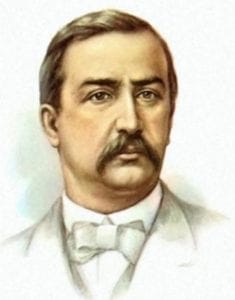

Alexander Borodin is remembered for his magnum opus, the great opera Prince Igor, which tells of the Kiev prince Igor Svyatoslavich fighting against the invading Turkic tribes known as Cumans, Kipchaks, or Polovtsians. He worked on the opera for seventeen years and left it unfinished because, in 1887, while attending a costumed ball, he slumped to the floor and died instantly. The opera was completed by Rimsky-Korsakoff and his pupil Glazunov. It received its first performance three years after the composer’s death. It contains the Polovtsian Dances, now often performed alone and probably his best known composition, supplying the melody for the popular song, Stranger in Paradise.
Music played second fiddle to medicine in the life of Alexander Borodin. He said he was almost ashamed when his musical activities took him away from the more serious medical life. Yet he began composing when nine years old, wrote a concerto at thirteen, and later symphonies and chamber music. He once claimed he could only compose when he was not well enough to give his lectures, so that his friends wished him ill-health, not good health. His friend Modest Mussorgsky introduced him to Mily Balakirev, who became his musical tutor for life and under whose guidance he composed his first symphony in 1869 and his second in 1877. In 1869 he began work on Prince Igor. In 1882 he composed the symphonic poem In the Steppes of Central Asia. In 1882 he began a third symphony but left it unfinished at his death; two movements of it were later completed and orchestrated by Glazunov.
Borodin entered the St. Petersburg Academy of Medicine as a student in 1850 at age sixteen, at a time when the discovery of aniline dyes was revolutionizing chemistry and medicine. His professor Zenin was working on these dyes and Borodin fell under his influence. He became an intern at a military hospital in St. Petersburg and received his MD degree in 1858 on a thesis of the analogy between arsenious and phosphoric acids. After graduation he worked in chemistry in Russia and between 1859 and 1862 in Western Europe, notably in Pisa, where he developed a method for measuring urinary urea nitrogen. Returning to St. Petersburg in 1862, he was appointed adjunct professor and in 1864 full professor at the Academy of Medicine. He worked there for the rest of his life on several chemistry projects, including the formation of beta hydroxybutyric aldehyde. He also invented a successful formula for black bread, now called Borodin bread. In 1877 he spent six months in Germany, visiting hospitals and laboratories in order to develop ideas for the reorganizing his laboratory. He loved teaching medical students, sometimes spending all day with them. Always ready to answer questions, he was very approachable and popular with the students, who felt quite at home with him.
Borodin was an unusual combination of different interests. Forever working on medicine, attending meetings, making reports or speeches and teaching students, he also advocated for liberal causes such as having women admitted into the Academy of Medicine, but above all is remembered for his secondary occupation of composing of beautiful music that has survived him for over one century and is frequently played in concert halls throughout the world.
Reference
- Cole, JC. Alexander Borodin, the scientist, the musician, and the man. JAMA 1969;208:129-130. doi:10.1001/jama.1969.03160010125017
